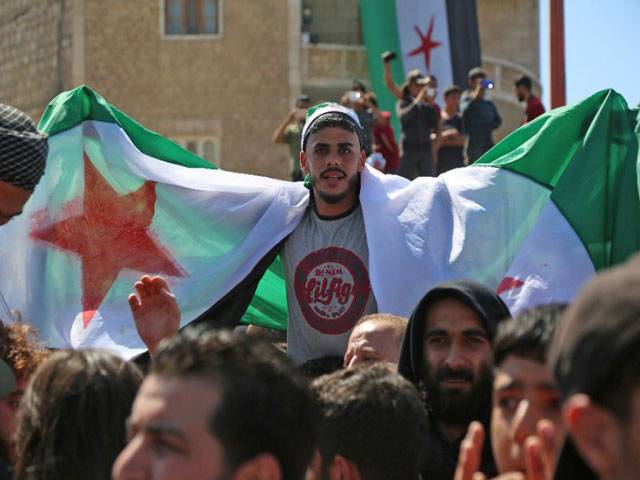AL MUNTAR - Syria's last major rebel bastion Idlib was Saturday targeted by the "most violent" Russian air strikes in a month, a monitor said, after the failure of a three-way summit on the Syrian conflict.
The renewed strikes came a day after the leaders of rebel backer Turkey and regime allies Russia and Iran failed at the summit in Tehran to agree on how to stave off a threatened offensive on the northwestern province of Idlib.
Aid organisations have warned that any military campaign to retake the region of nearly three million people on the Turkish border could spark one of the worst humanitarian disasters in Syria's seven-year war.
On Saturday, dozens of Russian air raids hit southern and southeastern areas of Idlib province, the Syrian Observatory for Human Rights monitoring group said. At least four civilians including two children were killed in the strikes and as dozens of barrel bombs were dropped by regime aircraft, the Britain-based monitor said.
An AFP correspondent in the southern village of Al-Muntar saw huge clouds of grey smoke billow up above olive trees after a barrel bombing.
Women and children ran terrified across nearby fields, one woman appearing to clutch a baby in a blanket. An elderly man sat out of breath, barefoot and dazed in the red earth, his walking cane by his side. The raids prompted hundreds of families to take to the roads, as dozens of cars and trucks tried to ferry civilians away from the bombardment.
Observatory head Rami Abdel Rahman said the raids targeted jihadist and rebel positions, some of which were empty and others in use.
It was the heaviest bombardment since August 10, when at least 53 civilians were killed in Idlib and the neighbouring province of Aleppo, he said. Idlib is largely controlled by Hayat Tahrir al-Sham, an alliance led by Al-Qaeda's former Syrian affiliate, as well as rival rebels.
The United Nations has warned that any offensive could force up to 800,000 people to flee their homes and urged key powerbrokers to avoid a "bloodbath". On Friday, Turkey's President Recep Tayyip Erdogan openly disagreed with his Russian counterpart Vladimir Putin at a press conference in the Iranian capital.
Erdogan called for a "truce", while Russia's president said Damascus "has a right and must eventually take under control all of its national territory". Iranian President Hassan Rouhani warned against a "scorched earth" policy, but said "fighting terrorism in Idlib is an unavoidable". President Bashar al-Assad's regime has upped its rhetoric on retaking control of Idlib and surrounding areas over the past month. The threat comes after it recaptured areas around the capital Damascus and in southern Syria earlier this year, through a combination of deadly bombardment and surrender deals.
With the spike in Russian raids on Saturday, Moscow was aiming to put pressure on Ankara to agree to a deal for a regime takover of Idlib, according to analyst Nicholas Heras.
"Russia is reminding Turkey it needs to stay in Russia's good graces if Turkey wants to avoid a painful catastrophe in northwest Syria," said the researcher at the Center for New American Security. Idlib's provincial health chief Munzer al-Khalil warned Saturday that a large-scale military operation could result in "the most catastrophic crisis in our war". Russian military spokesman Igor Konashenkov, for his part, said Moscow had "irrefutable information" that Syrian rebels were planning a "provocation" in Idlib province to justify Western intervention. More than 350,000 people have been killed and millions displaced since Syria's civil war started in 2011 with the brutal repression of anti-Assad protests.
Elsewhere on Saturday, clashes between Kurdish forces and regime fighters in the divided northeastern city of Qamishli killed 18 combatants, the Kurdish forces and the Observatory said.
Kurdish forces control most of Qamishli, but regime fighters and allied militiamen hold part of the city and its airport. The Observatory said shooting broke out when Kurdish security forces at a checkpoint demanded that regime fighters step out of their patrol vehicle but they refused. "When they did not comply, the shooting started on the car," Abdel Rahman said. The Kurdish forces said they had retaliated to regime fire. With US-led support, Syria's Kurds played a key role in the war against the Islamic State group, during which they seized large swathes of northern and northeastern Syria. The Damascus regime has vowed to reintegrate the Kurdish-held areas, by force if necessary. In late July, it opened talks with the Kurdish-led Syrian Democratic Forces.






